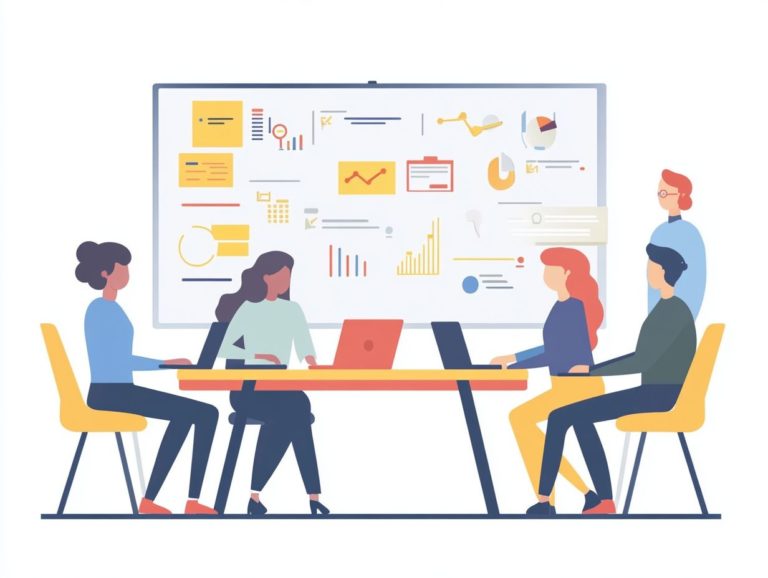Continuing Education for Project Management Professionals
In the dynamic realm of project management, staying current is crucial for your success and career progression.
Continuing education provides you the opportunity to refine your skills, acquire new knowledge, and meet certification requirements.
This article explores the significance of ongoing learning in project management, showcasing its advantages for your career growth.
It also covers various types of continuing education, offers guidance on selecting the right programs, and outlines best practices to help you maximize your learning journey.
Contents
- Key Takeaways:
- Overview of Continuing Education for Project Management Professionals
- Benefits of Continuing Education for Project Management Professionals
- Types of Continuing Education for Project Management Professionals
- Choosing the Right Continuing Education Programs
- Best Practices for Completing Continuing Education Requirements
- Frequently Asked Questions
- What is continuing education for project management professionals?
- Why is continuing education important for project management professionals?
- Explore Exciting Ways to Continue Your Education!
- Is continuing education mandatory for project management professionals?
- How can continuing education supercharge your career as a project management professional?
- Are there specific requirements for continuing education for project management professionals?
Key Takeaways:

Continuing education is vital for project managers to stay updated and maintain certifications. Choose accredited providers and manage your time well to fulfill your requirements effectively.
Overview of Continuing Education for Project Management Professionals
As a project manager, continuing education is your key to unlocking new opportunities! It is essential to elevate your knowledge and skills, especially for maintaining your PMI certification.
This journey entails earning Professional Development Units (PDUs), which are credits required for certification renewal, through various learning activities that align with the PMI Talent Triangle.
You ll explore areas like agile project management, business acumen, and leadership skills. Engaging in continuing education ensures you meet the necessary requirements for certification renewal while keeping pace with industry standards.
What is Continuing Education?
Continuing education involves learning activities designed to enhance your skills and knowledge, particularly if you need to meet specific educational requirements for certification.
These pursuits help you stay informed about industry trends, best practices, and emerging methodologies.
You can enroll in formal courses offered by accredited institutions that cover advanced project methodologies or risk management strategies.
Workshops provide invaluable hands-on experiences, promoting collaborative learning and practical application of concepts.
Alternatively, self-paced online training modules allow you to acquire knowledge at your convenience, accommodating your busy schedule while fulfilling educational criteria.
By combining these activities, you meet your certification requirements and boost your confidence in handling your role’s complexities.
Benefits of Continuing Education for Project Management Professionals
Continuing education offers numerous advantages that significantly influence your career growth within the industry.
Committing to ongoing education elevates your skill set, fulfills certification renewal requirements, and secures a competitive edge in the job market.
Pursuing continuing education aligns with the PMI Talent Triangle, ensuring you cultivate essential skills across multiple domains. This proactive approach enhances your expertise and positions you as a leader in project management.
Advantages for Career Growth and Development
One key benefit of pursuing continuing education is its remarkable impact on your career growth. By enhancing your qualifications and skills, you gain an edge in the job market.
Participating in workshops, obtaining certifications, or pursuing advanced degrees broadens your knowledge and strategically positions you for promotions and salary increases. For example, completing a PMP certification may lead you to manage larger, more complex projects with an accompanying pay raise.
Success stories abound for those who invest in their professional development through industry conferences or specialized training. A project manager who learns Agile methodologies, for instance, could significantly boost team productivity, leading to recognition and advancement within their organization.
These educational experiences are essential for unlocking new job opportunities and accelerating your professional trajectory.
Requirements for Maintaining Certification

To maintain your certification, you must meet specific continuing education criteria, which include earning a designated number of Professional Development Units (PDUs), credits earned through education and training, within a defined certification cycle.
This process is essential for ensuring that you remain updated with the evolving industry standards and practices. Don t wait! Make sure you earn your PDUs before your certification cycle ends.
Typically, you need to accumulate a total of 60 PDUs over a three-year period to keep your certification in good standing.
Eligible activities for PDUs can vary widely, including formal education, industry conferences, self-directed learning, or even volunteering. Keeping track of these credits is crucial; you can utilize tools suggested in the CCR Handbook to log your hours and categorize your activities effectively.
Ignoring these requirements could jeopardize your certification status, potentially leading to suspension or the need for re-examination. Staying informed and organized is vital.
Types of Continuing Education for Project Management Professionals
Explore a variety of exciting continuing education options just for you! These options include formal courses and training programs designed to meet diverse learning preferences and development needs.
From instructor-led training sessions to self-paced online courses, as well as informal learning experiences like project management simulations and workshops, you can select the format that aligns perfectly with your lifestyle and career aspirations.
Formal Courses and Training Programs
Formal courses and training programs, such as instructor-led sessions and PDU-eligible offerings, provide you with structured learning experiences designed to enhance your project management expertise.
These programs come in different formats to fit your learning style whether you thrive in the dynamic atmosphere of in-person classes or prefer the flexibility of online courses that allow you to study at your own pace.
Typically, the costs of these courses can vary significantly, ranging from a few hundred to several thousand dollars, depending on the depth and duration of the training.
It’s crucial to note that these formal courses not only help you meet continuing education requirements but also offer the added benefit of skill enhancement. This ensures you remain competitive in a constantly evolving landscape.
You’ll likely emerge with a deeper understanding of project management methodologies and practical techniques, giving you the power to manage projects more effectively.
Informal Learning and Professional Development
Informal learning and professional development activities are essential components of your continuing education journey. They allow you to engage in enriching experiences beyond traditional classroom environments.
Activities like networking events, specialized workshops, and immersive project management simulations enhance your professional toolkit. They offer hands-on experiences that translate theoretical concepts into practical applications.
By participating in these informal settings, you can collaborate with peers, exchange insights, and gain diverse perspectives that often spark innovative solutions.
These opportunities complement formal education beautifully, giving you the power to apply new concepts to your current projects immediately. As a result, you enhance both your skill set and overall job performance, setting yourself apart in the competitive landscape of project management.
Choosing the Right Continuing Education Programs
Choosing the right continuing education programs is crucial for you as a project management professional. It ensures that your learning aligns with your personal aspirations and meets the evolving demands of the industry, especially if you consider essential project management courses for certification.
By carefully evaluating available options and pinpointing accredited providers, you can make informed decisions that elevate your skills and satisfy certification requirements.
Finding Accredited Providers

Finding accredited providers for continuing education is vital for you as a project management professional. It ensures that your training aligns with the education standards set by PMI for certification renewal.
This process guarantees the quality of the education you receive and protects the value of your hard-earned certifications.
Start by exploring the Project Management Institute’s official website, where you ll find a comprehensive list of recognized training providers. Delving into user reviews can offer valuable insights into the effectiveness and relevance of specific programs.
By opting for accredited courses, you can efficiently earn the Professional Development Units (PDUs) necessary to maintain your certification. This choice enhances your career prospects and showcases your commitment to ongoing professional growth!
Considering Personal Goals and Interests
When selecting continuing education programs, think about your goals and interests. This ensures that your learning experience is both relevant and engaging.
This intentional approach aligns your studies with your aspirations and cultivates a deeper connection to the material.
By reflecting on what truly motivates you, you can choose courses that resonate with your ambitions, ultimately boosting your enthusiasm for learning.
Aligning your educational pursuits with your personal aspirations enriches your learning journey and sets the stage for future success in your career.
Best Practices for Completing Continuing Education Requirements
Implementing best practices for completing your continuing education requirements is crucial. It allows you to manage your learning effectively while ensuring compliance with certification mandates.
- Hone your time management skills.
- Set clear learning objectives.
- Maximize retention through diverse educational techniques.
Embracing these approaches elevates your proficiency and helps you maintain your competitive edge!
Time Management and Planning
Effective time management and planning are essential for navigating your continuing education requirements successfully. Balancing your professional and educational commitments efficiently is key.
Employ strategic techniques like prioritizing learning activities based on their relevance and urgency to ensure that your time is spent on the most impactful courses.
Implement a structured schedule with designated study periods to enhance your productivity. Even short, focused sessions can yield significant progress.
Utilizing tools like calendars and task management apps helps you sidestep procrastination and track your progress toward earning PDUs. You can seamlessly integrate education into your work schedule by seeking out learning opportunities that align with your job tasks, such as participating in relevant webinars or workshops. This way, you maximize both your time and effort.
Maximizing Learning and Retention
Maximizing your learning and retention is crucial as a project management professional engaged in continuing education. It ensures that the knowledge and skills you acquire are effectively applied in your role.
Incorporate active learning techniques, such as group activities and simulations, to deepen your understanding of complex concepts. Practical applications of your newly acquired skills in real-world scenarios enhance their relevance and utility.
Engaging in peer discussions is another valuable strategy, allowing you to share insights and challenge each other’s perspectives, further solidifying your grasp of the material.
Encouraging these methods reinforces your learning outcomes and gives the power to you to enhance your job performance effectively, making your educational journey impactful and enriching.
Frequently Asked Questions

What is continuing education for project management professionals?
Continuing education for project management professionals refers to ongoing learning options that allow project managers to enhance their skills, knowledge, and expertise, including understanding how to maintain your project management certification.
These learning options can take various forms, improving both individual performance and overall effectiveness in managing projects.
Why is continuing education important for project management professionals?
Continuing education is vital for project management professionals because it keeps them updated on industry trends, best practices, and emerging technologies. It also helps maintain certification, improves job performance, and enhances career advancement opportunities.
Explore Exciting Ways to Continue Your Education!
- Attending workshops, conferences, and seminars
- Completing online courses
- Reading industry publications
- Participating in professional development programs offered by project management organizations
Is continuing education mandatory for project management professionals?
It depends on the specific certification and professional requirements of the project management organization or governing body. Some certifications, such as the PMP certification from the Project Management Institute (PMI), require a certain number of continuing education hours to maintain certification.
How can continuing education supercharge your career as a project management professional?
Continuing education can supercharge your career by helping you stay competitive in the job market, increasing your earning potential, and enhancing job performance and satisfaction.
It also provides valuable networking opportunities, enabling you to build a robust professional network within the project management community.
Are there specific requirements for continuing education for project management professionals?
Yes, specific requirements for continuing education vary depending on the certification and professional organization. Check the requirements regularly to stay ahead!
It s crucial to ensure you meet the guidelines set by your certification and professional organization.
Consider actively pursuing continuing education to enhance your career and stay current in the ever-evolving field of project management!






